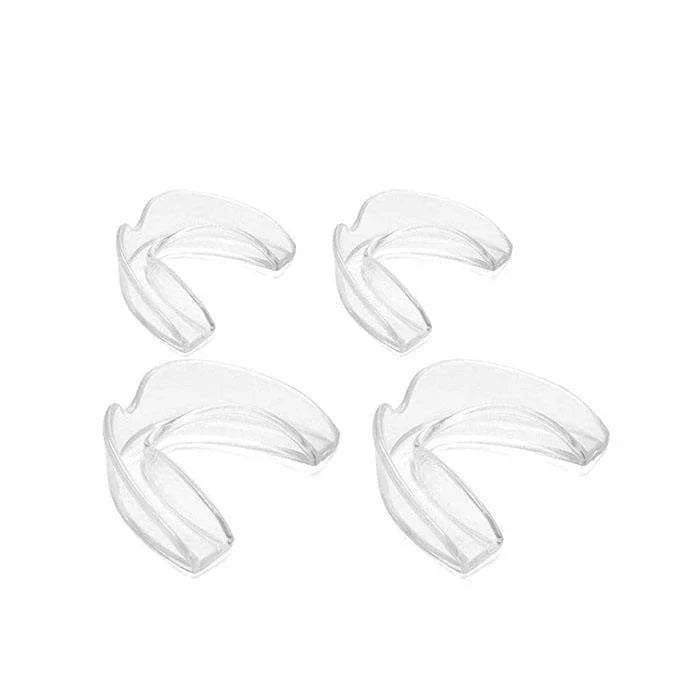Snoring might seem like a harmless (if annoying) habit, but it’s often a sign that your breathing isn’t as smooth as it should be while you sleep.
Beyond disturbing your partner, chronic snoring can disrupt your sleep quality and even indicate bigger health problems.
Fortunately, one simple tool can make a huge difference: a mouth guard.
If you’re tired of sleepless nights (or your partner is), here’s how a mouth guard for sleeping can help reduce snoring, improve your breathing, and boost your overall sleep quality.
What Causes Snoring?
Snoring happens when the flow of air through your mouth and throat is partially blocked during sleep.
As you breathe, soft tissues in the airway vibrate, creating that familiar rattling sound.
Common causes of snoring include:
-
Sleeping on your back
-
Relaxed throat muscles during deep sleep
-
Nasal congestion or allergies
-
Being overweight
-
Alcohol consumption before bed
-
Sleep apnea
In many cases, airway collapse or tongue position plays a major role—and that’s where a mouth guard can help.
How Does a Mouth Guard Help with Snoring?
Not all mouth guards are just for teeth grinding. Some are specially designed to help with snoring and mild sleep apnea by repositioning your jaw or tongue to keep your airway open.
Here’s how:
✅ Jaw Repositioning
Certain anti-snoring mouth guards move the lower jaw slightly forward, preventing the tongue from falling backward and blocking the airway.
✅ Tongue Stabilization
Some guards hold the tongue in place so it doesn’t slip into the airway during sleep.
✅ Preventing Teeth Clenching
Bruxism (teeth grinding) can tense up the jaw muscles and worsen snoring.
A mouth guard for bruxism helps relax the jaw, reducing snoring linked to muscle tension.
Result:
Better airflow → Less vibration → Quieter nights → Healthier sleep!
Who Should Try a Mouth Guard for Snoring?
A mouth guard is a great solution if you:
-
Snore regularly (especially when sleeping on your back)
-
Wake up feeling tired despite a full night’s sleep
-
Have mild to moderate sleep apnea (diagnosed by a doctor)
-
Want a non-invasive, drug-free way to manage snoring
-
Grind or clench your teeth at night
Pro Tip:
If you have severe sleep apnea, always consult a sleep specialist before using a mouth guard as your only treatment.
Types of Mouth Guards for Snoring
1. Mandibular Advancement Devices (MADs)
These mouth guards move your lower jaw slightly forward.
They’re the most common type for snoring relief and are often adjustable for comfort.
2. Tongue Retaining Devices (TRDs)
These hold the tongue in a forward position, ideal if your tongue tends to block your airway.
3. Boil-and-Bite Mouth Guards
Affordable, customizable options that can offer snoring relief if designed for jaw repositioning.
4. Bruxism Mouth Guards
Even if not specifically labeled for snoring, reducing teeth clenching with a bruxism guard can sometimes indirectly help lessen nighttime noise.
Benefits of Using a Mouth Guard for Snoring
-
Improved Sleep Quality: Quieter nights mean deeper, more restful sleep.
-
Better Mood and Energy: Poor sleep affects everything from mood to memory to weight management.
-
Protects Teeth: Reduces grinding and clenching, preventing dental damage.
-
Non-Invasive: No surgery, no medication, and easy to use.
-
Portable: Perfect for home or travel.
How to Use a Mouth Guard for Best Results
-
Mould the Mouth Guard Properly
If it’s a boil-and-bite type, follow the instructions carefully to get a snug fit. -
Wear it Consistently
Use it every night. It might feel odd at first but stick with it—your body will adjust. -
Keep It Clean
Clean the guard daily to prevent bacteria buildup and bad odors. -
Replace When Needed
Signs like cracks, loss of fit, or persistent smell mean it’s time for a new one.
FAQs About Mouth Guards and Snoring
Q: Can a mouth guard completely cure snoring?
A: It can significantly reduce snoring caused by mild airway obstruction, but for serious cases or sleep apnea, a CPAP machine or professional help may be needed.
Q: Is it uncomfortable to wear a mouth guard at night?
A: Some initial adjustment is normal. After a few nights, most people find it very comfortable and natural.
Q: How long does a mouth guard last?
A: With good care, a quality sleeping mouth guard lasts around 6–12 months.
Q: Can it help with sleep apnea?
A: For mild to moderate cases, a mouth guard can be very effective. Always consult a doctor if you have been diagnosed with sleep apnea.
Common Mistakes to Avoid
❌ Choosing the wrong size (too loose or too tight)
❌ Not molding the mouth guard properly
❌ Skipping cleaning and letting bacteria grow
❌ Giving up after just one or two nights of slight discomfort
Final Thoughts
Snoring isn’t just annoying—it’s a red flag that your sleep (and health) might need help.
A well-fitted mouth guard can be a simple, affordable, and highly effective way to reduce snoring and get better rest.
Better sleep doesn’t just help you feel good—it improves every area of your life, from focus to relationships to heart health.
🦷 Sleep quieter, breathe easier, and wake up refreshed! Discover our top-rated Mouth Guards today and experience the difference a good night’s sleep can make. Order now and take the first step to better nights. 🦷

